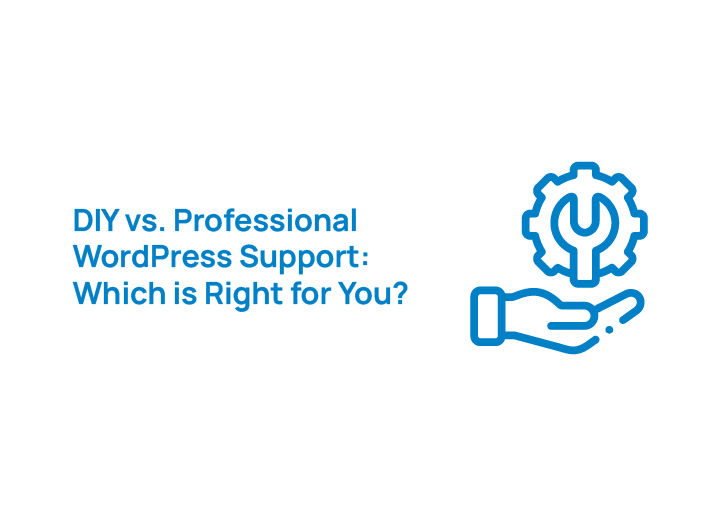Managing a WordPress website can be exciting, but it comes with its own set of challenges. Whether you’re building a personal blog, online e-commerce store, or custom site, maintaining it properly is key to ensuring its success. However, keeping your site in top shape requires regular security patches, performance monitoring, and ongoing website maintenance. So, now comes the big comparison: DIY vs. professional WordPress support.
In this blog, we’ll break down both options, helping you decide the best path based on your technical skills, future projects, and ongoing support needs. Whether you’re a hands-on website owner or prefer professionals to ensure your site stays secure and optimized, we’ve got you covered.
DIY WordPress Support

Managing a WordPress site on your own can be a rewarding experience. It allows you to have full control over your site and can save you money in the long run. However, it’s essential to understand what DIY WordPress support entails before jumping in.
Understanding DIY WordPress Support
DIY WordPress support involves managing all aspects of your website independently. This includes installation, updates, security, backups, troubleshooting, and more. With countless online resources, tutorials, and community forums, many find this approach empowering and cost-effective. By taking a hands-on approach, you can tailor every aspect of your site to fit your unique needs and preferences.
Key Services
- Installation and Setup: Setting up WordPress, choosing themes, and installing plugins. You’ll start with selecting a hosting provider, purchasing a domain name, and installing WordPress. Afterward, you’ll choose and install a theme that matches your brand and configure necessary plugins to add functionality to your site.
- Updates: Regularly updating WordPress core, themes, and plugins. Keeping your site up-to-date is crucial for security and performance. This involves periodically checking for updates and applying them to avoid vulnerabilities and ensure compatibility.
- Security: Implementing security measures such as firewalls, security plugins, and regular scans. You’ll need to set up security plugins, monitor for suspicious activity, and perform regular security audits to protect your site from hackers and malware.
- Backups: Setting up and managing regular backups. Backups are essential to prevent data loss. You’ll need to configure automated backups and store them in a secure location, ensuring you can restore your site in case of an emergency.
- Troubleshooting: Resolving technical issues, fixing bugs, and compatibility problems. When issues arise, you’ll be responsible for diagnosing and fixing them, which can involve a steep learning curve and a good deal of patience.
Pricing
DIY support is generally free, except for costs associated with premium themes, plugins, and hosting services. Hosting can range from $5 to $30 per month, premium themes might cost $30 to $100, and premium plugins can add up, depending on the functionalities you need.
Pros and Cons
Understanding the advantages and disadvantages of DIY support can help you make an informed decision. Here are some key points to consider:
Pros
- Cost-Effective: Minimal financial investment required. By avoiding the costs of professional services, you can allocate your budget to other areas of your business.
- Control: Full control over your website and its management. You decide what changes to make and when to implement them, giving you complete creative freedom.
- Learning Experience: Opportunity to learn and understand WordPress deeply. Gaining hands-on experience with WordPress can be invaluable, especially if you enjoy learning new skills and solving problems.
- Flexibility: Freedom to make changes and adjustments at any time. Without relying on external support, you can quickly adapt your site to changing needs and preferences.
Cons
- Time-Consuming: Managing a website can be time-intensive. Regular maintenance, updates, and troubleshooting can take a significant amount of your time, which could be spent on other important tasks.
- Steep Learning Curve: Requires a significant amount of time to learn and master. Without prior experience, you might find yourself spending hours researching and experimenting with different solutions.
- Limited Expertise: Potential for mistakes due to lack of professional knowledge. Even with ample resources available, there’s a risk of making errors that could affect your site’s performance and security.
- Responsibility: Full responsibility for any issues or downtime. If your site goes down or encounters a major problem, it’s up to you to fix it, which can be stressful and challenging.
Reviews/Ratings
Many DIY users appreciate the cost savings and the learning experience but often express frustration over the time commitment and technical challenges. User reviews on forums and blogs frequently highlight the sense of accomplishment from managing their site but also note the occasional difficulties in dealing with complex issues.
Learn More: Role of WordPress Maintenance in Improving Site Search Functionality
Professional WordPress Support

Professional support can be a game-changer, especially for those who lack the time or technical expertise to manage their site. Let’s explore what professional WordPress support offers and why it might be the right choice for you.
What Professional WordPress Support Offers?
Professional WordPress support involves hiring WordPress developers to manage and maintain your website. These services can range from basic maintenance to comprehensive management, including custom development, SEO, and performance optimization. By outsourcing these tasks, you can ensure that your site is handled by professionals who are well-versed in best practices and up-to-date with the latest WordPress developments.
Key Services
- Website Maintenance: Regular updates, security checks, and backups. Professionals will handle all routine maintenance tasks, ensuring your site remains secure and up-to-date.
- Performance Optimization: Improving website speed and performance. This involves optimizing images, leveraging caching, and other techniques to ensure your site loads quickly and efficiently.
- Security Management: Advanced security measures, regular monitoring, and threat resolution. Professional services often include proactive monitoring and immediate response to any security threats, reducing the risk of data breaches and other issues.
- Custom Development: Tailored solutions, theme customization, and plugin development. Whether you need a custom plugin or a unique theme, professional developers can create solutions that perfectly fit your needs.
- SEO Services: Enhancing search engine visibility and traffic. Professionals can optimize your site’s content and structure to improve its ranking on search engines, driving more traffic and potential customers.
- 24/7 Support: Round-the-clock assistance for any issues or emergencies. Having access to support at any time ensures that any problems can be addressed quickly, minimizing downtime and disruption.
Pricing
Professional support services vary in cost, typically ranging from $50 to $500 per month, depending on the level of service and expertise required. Some high-end services might even charge more, especially if they offer comprehensive packages that include advanced features and dedicated support.
Pros and Cons
Evaluating the pros and cons of professional support can help you determine if this option aligns with your needs and budget. Here are some key considerations:
Pros
- Expertise: Access to experienced professionals with specialized knowledge. Professional support teams have the skills and experience to handle a wide range of issues, ensuring your site operates smoothly.
- Time-Saving: Frees up time to focus on other aspects of your business. By delegating website management tasks, you can concentrate on growing your business and serving your customers.
- Reliability: Assurance of regular maintenance and quick resolution of issues. Professional services provide peace of mind, knowing that your site is in good hands and any problems will be promptly addressed.
- Advanced Services: Access to advanced features and custom solutions. Professionals can implement complex features and customizations that might be beyond your capabilities as a DIY user.
Cons
- Cost: Higher financial investment compared to DIY. The cost of professional support can be a significant factor, especially for small businesses or personal sites with limited budgets.
- Dependency: Reliance on external support for website management. Depending on an external provider means you might have less control over certain aspects of your site and must trust the provider to handle issues effectively.
- Less Control: Limited control over certain aspects of your website. While professionals handle most tasks, you might feel a loss of control over specific changes or updates, which could be a drawback if you prefer hands-on management.
Reviews/Ratings
Users of professional support services often highlight the peace of mind and time savings as major benefits, though some express concerns over the cost. Reviews generally indicate high satisfaction with the expertise and reliability of professional support, with many users appreciating the convenience and improved website performance.
Keep Reading: Unlimited WordPress Support
Seamless WordPress Support, Scale Your Business with Ease!
Contact us today to learn how we can help you streamline your workflow and enhance client satisfaction!
Comparing DIY vs. Professional WordPress Support

Choosing between DIY maintenance and professional expertise for your own WordPress site can be a tough decision. To make the right choice, it’s essential to compare both options based on key aspects like cost, time, expertise, and control. Let’s break it down in simple terms.
Cost: Budget-Friendly vs. Comprehensive Services
- DIY Approach: A cost-effective solution since you only need to pay for WordPress themes, hosting, and installing plugins. This is a great choice for personal projects or smaller websites where keeping expenses low is a priority.
- Professional Maintenance: While it requires a bigger investment, it covers security monitoring, performance optimization, and post-launch support. For complex projects or business websites, the added cost ensures smooth functionality and expert handling of technical tasks.
Time and Effort: Managing vs. Outsourcing
- DIY Maintenance: Be ready to spend significant time managing your own site—from handling website downtime and outdated plugins to troubleshooting contact forms. If you enjoy learning WordPress and have the patience for it, this approach can work.
- Professional Site Support: Saves your time by outsourcing maintenance to web development professionals. They ensure your site stays secure, updated, and optimized so you can focus on web design, business growth, or content creation.
Expertise: Self-Learning vs. Professional Knowledge
- DIY WordPress Development: The do-it-yourself approach requires a learning curve. While it’s a great opportunity to build skills, mistakes can lead to security breaches or poor search engine rankings if not handled properly.
- Professional Expertise: Hiring WordPress professionals ensures that your website’s functionality is managed correctly. They handle technical details, optimize custom designs, and prevent common issues before they become major problems.
Control: Full Independence vs. Hands-Off Approach
- DIY Projects: You have full control over your own WordPress site, deciding on generic templates, updates, and site customization. However, managing everything yourself can sometimes feel overwhelming.
- Professional WordPress Maintenance: While you may have less hands-on involvement, professionals ensure your site stays secure, updated, and optimized. Some agencies even offer a free consultation to help you find the right balance between control and expert support.
Making the Right Choice: DIY vs. Professional WordPress Support
Choosing between DIY and professional WordPress support depends on your unique needs, budget, and goals. Here’s a guide to help you make the best decision:
When to Choose DIY Support
- Budget Constraints: If you have a tight budget and can’t afford professional services. DIY is ideal for those looking to minimize costs.
- Learning Enthusiast: If you enjoy learning and want to understand WordPress deeply. DIY offers a valuable learning experience for those interested in developing new skills.
- Simple Websites: If your website is relatively simple and doesn’t require advanced features. For straightforward sites, DIY support might be sufficient to meet your needs.
When to Choose Professional Support
- Time-Sensitive: If you have limited time to manage your website. Professional support is beneficial for those with busy schedules who need to delegate website management tasks.
- Complex Websites: If your website requires advanced features or custom development. For sites with complex requirements, professional support ensures that all technical aspects are handled by experts.
- Business Focused: If you prefer to focus on your core business activities rather than website management. Professional support allows you to concentrate on growing your business while professionals handle your website.
Final Reading: Essential WordPress Tasks You Should Never DIY
Conclusion
The choice between DIY and professional WordPress support ultimately depends on your specific needs, budget, and goals. DIY support can be cost-effective and empowering but requires time and technical knowledge. Professional support offers expertise and convenience but comes at a higher cost. Carefully evaluate your situation to make the best decision for your website’s success. By understanding the pros and cons of each option, you can ensure that your WordPress site is well-managed and positioned for growth and success.
FAQs
Is DIY WordPress maintenance good for beginners?
Yes, if you’re willing to learn the initial setup and security basics. But in today’s digital landscape, regular updates and backups are crucial to keep your site secure.
What key factors should I consider when choosing DIY or professional support?
Consider your skills, budget, and site complexity. DIY offers complete control, but professional support ensures security, reliability, and ongoing maintenance.
Does DIY maintenance give me full control over my site?
Yes, you have complete control over themes, plugins, and security. However, troubleshooting issues can be time-consuming without expert help.
How do I keep my site secure with DIY maintenance?
Update plugins and themes, use strong passwords, enable SSL, and install security plugins. If this feels overwhelming, professional support can help.


